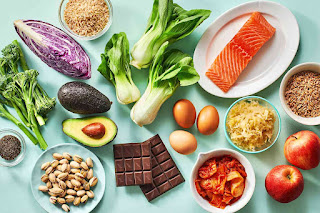The Complete Guide to Low-Calorie Vegetables for Successful Weight Loss
In the pursuit of weight loss, integrating nutrient-rich, low-calorie vegetables into your daily diet can be a game-changer. These vegetables, often dubbed as "calorie-free," not only aid in shedding unwanted pounds but also offer a plethora of essential vitamins, minerals, and fiber crucial for overall well-being. In this comprehensive guide, we'll explore a variety of such vegetables, highlighting their benefits, versatile applications, and how they can accelerate your weight loss journey.
Spinach: The Nutrient Powerhouse
Spinach, adorned with its lush green leaves, stands as a nutritional powerhouse. Packed with vitamins A, C, and K, along with iron and folate, it boasts low-calorie content and high fiber, making it a weight-loss-friendly option. Incorporating spinach into your meals adds volume and essential nutrients without significantly increasing calorie intake. Additionally, its rich antioxidant content helps combat oxidative stress and inflammation, supporting overall health.
Carrots: Crisp and Colorful
Carrots not only offer a satisfying crunch but also boast low-calorie content and high fiber. Their vibrant orange hue signifies a wealth of beta-carotene, a potent antioxidant known for supporting eye health and immunity. Including carrots in your diet introduces a burst of flavor and texture without adding excess calories. Moreover, their high beta-carotene content promotes skin health by converting into vitamin A within the body.
Cucumbers: Hydrating and Refreshing
Comprising over 95% water, cucumbers are an excellent choice for staying hydrated during weight loss endeavors. With their crisp texture and mild flavor, they add volume to salads and snacks without contributing significantly to calorie intake. Additionally, cucumbers contain silica, supporting healthy skin, hair, and nails, further enhancing their appeal as a beauty food.
Cabbage: Versatile and Nutrient-Rich
Cabbage, available in various varieties, is low in calories and rich in fiber and antioxidants. Whether it's green, red, or Napa cabbage, incorporating it into meals promotes satiety and aids digestive health. Belonging to the cruciferous vegetable family, cabbage offers cancer-fighting properties due to its high glucosinolates and sulforaphane content.
Methi (Fenugreek Leaves): A Flavorful Addition
Methi, or fenugreek leaves, a staple in Indian cuisine, offer a distinct flavor profile and numerous health benefits. Rich in fiber, vitamins, and minerals, methi leaves aid digestion, promote satiety, and support weight loss efforts. Fenugreek seeds, another form of fenugreek, help regulate blood sugar levels and improve insulin sensitivity, beneficial for individuals with diabetes.
Broccoli: The Ultimate Superfood
Broccoli, hailed as a superfood, boasts a remarkable nutritional profile. Low in calories yet high in fiber, vitamins C and K, and antioxidants, it supports weight loss and overall health. Broccoli's sulforaphane content exhibits anti-inflammatory and anticancer properties, making it a valuable addition to any diet.
Bell Peppers: Vibrant and Flavorful
Bell peppers, available in various colors, offer unique nutrients. Whether red, yellow, orange, or green, they are low in calories and high in vitamin C and antioxidants. Incorporating bell peppers into meals enhances flavor and provides essential nutrients without excess calories. Moreover, bell peppers contain capsaicin, boosting metabolism and promoting fat loss.
Cauliflower: Versatile and Low in Calories
Cauliflower serves as a versatile, low-calorie alternative in various dishes. With its mild flavor and ability to absorb flavors, it's favored by those seeking to reduce calorie intake. Rich in vitamins C and K, and fiber, cauliflower supports weight loss efforts. Additionally, it's a good source of choline, benefiting brain health and metabolism.
Zucchini: Light and Refreshing
Zucchini, or courgette, a summer squash, offers a mild flavor and tender texture. Low in calories and carbohydrates, it's an excellent choice for weight-conscious individuals. Whether raw in salads, spiralized into "zoodles," or grilled, zucchini's high water content keeps you hydrated and full. Rich in antioxidants like vitamin C and manganese, it supports overall health and well-being.
Celery: Crunchy and Filling
While celery isn't truly a "negative-calorie" food, its incredibly low-calorie content makes it a satisfying, guilt-free snack option. Its high water content and fibrous texture help curb hunger without adding significant calories. Celery is also rich in vitamin K and potassium, supporting bone health, blood clotting, and fluid balance.
Conclusion
Incorporating low-calorie vegetables into your diet is a wise strategy for weight loss and overall health. Spinach, carrots, cucumbers, cabbage, methi, broccoli, bell peppers, cauliflower, zucchini, and celery offer essential nutrients while aiding weight loss goals. By diversifying your vegetable intake, you create delicious, nutritious meals that nourish your body and support your well-being. Embrace these nutrient-dense vegetables, and witness the transformation as you embark on a healthier lifestyle.




Comments
Post a Comment